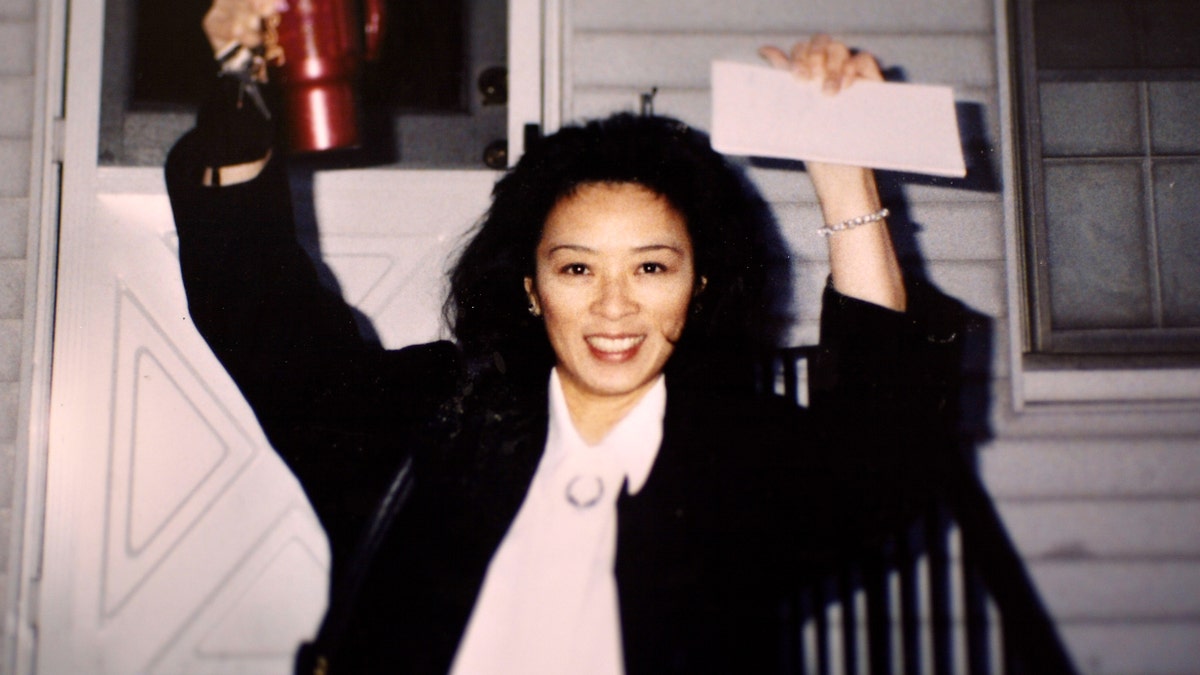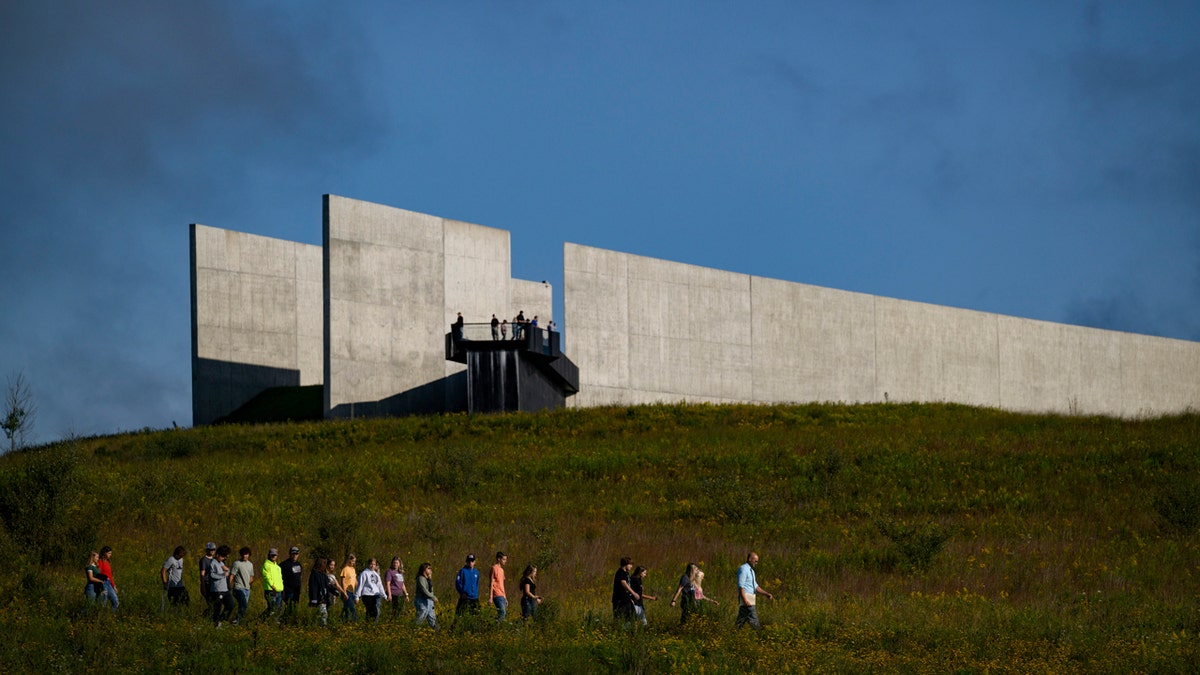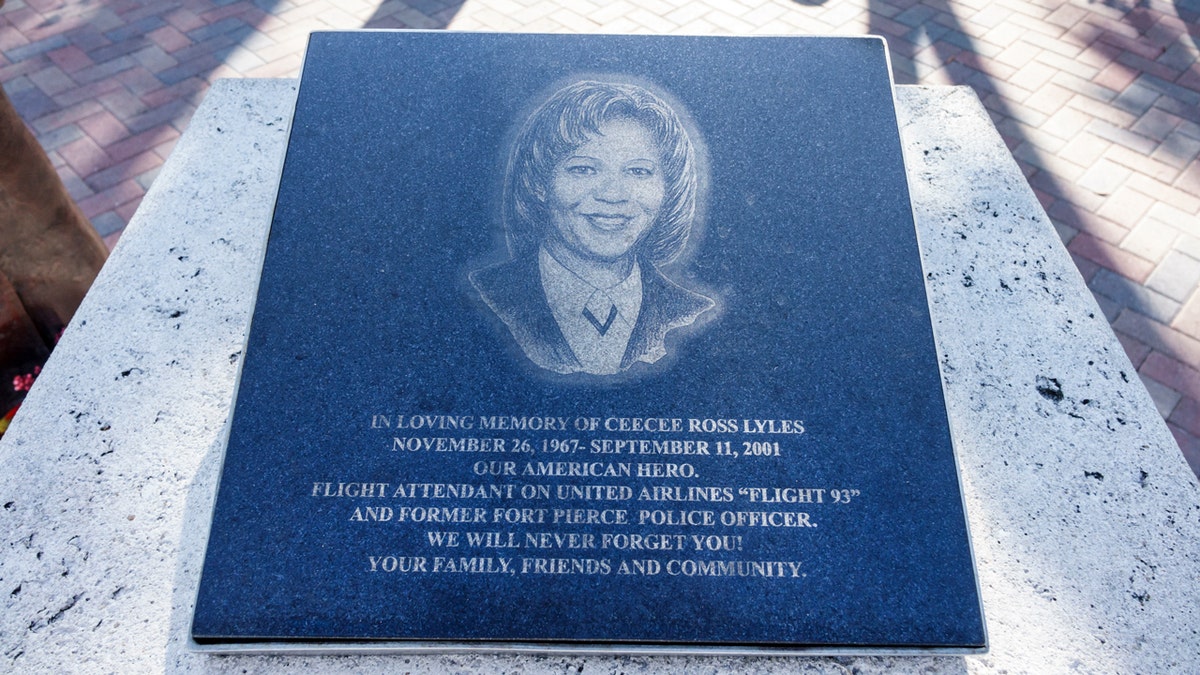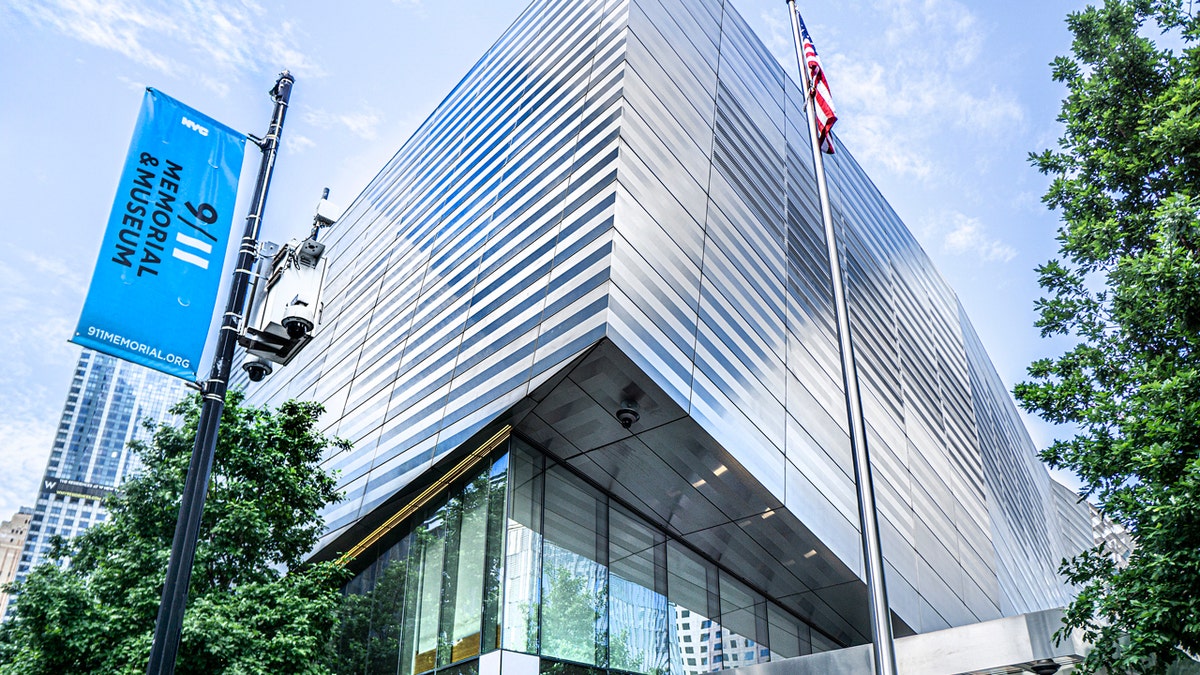Heroism, bravery displayed on 9/11 by plane passengers who made phone calls from hijacked aircraft

In the face of horror, passengers on hijacked commercial planes made heroic phone calls to loved ones and emergency personnel, providing vital information about the tragic events unfolding before them.
On September 11, 2001, two of the planes hijacked by terrorists hit the World Trade Center’s Twin Towers in New York City and another hit the Pentagon in Arlington, Virginia.
The fourth plane was headed for Washington, D.C. Those on United Airlines Flight 93 made calls to family members, friends and emergency operators.
The phone calls from plane passengers on September 11, 2001, displayed great courage, heroism and were instrumental for those on the ground to understand the events that were ongoing in the sky. (Gary Hershorn/Getty Images)
VISIT A MEMORIAL SITE, PARTICIPATE IN A HERO RUN AND MORE WAYS TO HONOR THE LIVES LOST ON 9/11
Through these calls, those on the ground gathered information about the hijacked plane and passengers learned about the attacks on the World Trade Center and the Pentagon.
Passengers on the flight heroically fought against the hijackers, causing the plane to miss its intended target and crash in a Shanskville, Pennsylvania, field. Today, a memorial stands where the plane crashed.
Many of the details regarding the calls made from the hijacked planes have been made public, primarily through evidence in the trial of Zacarias Moussaoui in 2006, which included FBI interviews with recipients of the calls and notes from the published report of the 9/11 Commission.
Other calls, such as the recorded message from a man named Brian Sweeney to his wife, are part of the 9/11 Memorial & Museum.
ICONIC 9/11 PHOTOS AND THE PHOTOGRAPHERS WHO SHOT THEM: HERE ARE THEIR STORIES
Below are transcripts and details of the courageous calls made by passengers who were on board hijacked flights on September 11, 2001.
- Betty Ann Ong call to American Airlines reservation desk
- Marion Britton’s call to friend Fred Fuimano
- Sandy Bradshaw’s call to the Speed Dial Fix number
- Todd Beamer’s call to GTE Airfone operators
- Tom Burnett’s call to his wife, Deena
- Edward Felt’s call to 911
- Jeremy Glick’s call to his mother-in-law and his wife, Lyzbeth
- CeeCee Lyles’ call to her husband, Lorne
- Brian Sweeney’s call to his wife, Julie
- Mark Bingham’s call to his aunt and mother
1. Betty Ann Ong’s call to American Airlines reservation desk
Betty Ann Ong was a flight attendant for American Airlines. The Boston-based flight attendant was working on American Airlines Flight 11 on September 11, 2001.
When the plane was hijacked, Ong quickly made a call to the American Airlines reservation desk.
“The cockpit is not answering. Somebody’s stabbed in business class, and, um, I think there’s Mace and we can’t breathe. I don’t know, I think we are getting hijacked,” Ong said on the call, according to the 911 Memorial website.
Ong was on the phone for 23 minutes.

Betty Ann Ong was on hijacked Flight 11 that crashed into the North Tower. Ong, a flight attendant, made a call to the American Airlines reservation desk to provide details of the hijacking. (LIZ HAFALIA/The San Francisco Chronicle via Getty Images)
2. Marion Britton’s call to friend Fred Fuimano
Marion Britton called her friend, Fred Fuimano, from Flight 93 at 9:49 a.m.
FBI agents interviewed Fuimano about the details of the call. The transcript was shared on the National Park Service website.
FDNY SLAMS 9/11 PLEA DEAL ‘WE ARE DISGUSTED AND DISAPPOINTED’
“Britton said her plane was hijacked and to take down the phone number. [Fuimano] told her not to worry because they would probably just take her to some other country. Britton said the hijackers had cut two passengers throats. [Fuimano said] that two planes had crashed into the World Trade Center, and Britton responded that she knew. Britton said they were turning and going to crash. [Fuimano] then heard a lot of screaming and then the phone went dead.”
3. Sandy Bradshaw’s call to the Speed Dial Fix number
Sandy Bradshaw was a flight attendant on Flight 93. Her phone call was to the Speed Dial Fix number at the United Airlines maintenance facility in San Francisco.
This line is typically used for reporting any mechanical and system problems, troubleshooting and requesting maintenance. She alerted those on the other line that there were hijackers on the flight, that they talked about a bomb, took out a knife and killed a flight attendant.
Bradshaw also called her husband, Phil, from the flight.

The Flight 93 Memorial in Pennsylvania honors all those who displayed great courage by fighting back, causing the plane to miss its intended target. (Jeff Swensen/Getty Images)
4. Todd Beamer’s call to GTE Airfone operators
Todd Beamer was a passenger on Flight 93 who made a call to GTE Airfone operators at 9:43 a.m.
He also made prior calls to AT&T as well as to his wife, but both calls did not go through. The call to GTE Airfone operators provided the following information, according to the 9/11 Commission Report, per the National Park Service website.
“The flight had been hijacked, and the captain and first officer were lying on the floor of the first-class cabin and were injured or possibly dead. One of the hijackers had a red belt with a bomb strapped to his waist. Two of the hijackers, who had knives, entered the cockpit and closed the door behind them. At some point the hijackers closed the curtain between first class and coach so that passengers could not see into first class; those in the rear of the plane were not being monitored by the hijackers. The plane was going up and down and had turned or changed direction. He and some other passengers were planning something and he was going to put the phone down.”
The phone operators that Beamer was in contact with were also interviewed by the FBI. This interview uncovered further details of a plan to fight back against the hijackers.
“Beamer asked if he could be connected with his wife, or if that was not possible, if a message could be passed to his wife telling her that he loved her. The second GTE/Airfone operator said she could hear ‘screams, prayers, exclamations, and talk of subduing the hijackers…’ At approximately 9 am CST (10 am EST), Beamer said that the passengers were about to attack the hijackers.”

The calls made by hijacked plane passengers displayed heroism on a dark day in American history. (BRYAN R. SMITH/AFP via Getty Images)
5. Tom Burnett’s call to his wife, Deena
Tom Burnett was a passenger on Flight 93. He made a call to his wife, Deena, and spoke to her for 28 seconds at 9:30 a.m.
According to an FBI interview with Deena, she informed her husband that two planes had flown into the World Trade Center. Seven minutes later, he spoke to his wife again.
“The passenger that had been knifed had died,” reads a quote from the FBI interview with Deena. “He told her ‘they’ were in the cockpit. She asked her husband to sit still. Thomas Burnett asked his wife, who previously worked in the airline industry, what was the probability of a bomb being on board the plane. Deena did not respond and Thomas Burnett stated he did not think they had a bomb because he did not see one; only knives.”
VICTIMS TRAPPED IN TWIN TOWERS ON 9/11 SOUGHT HELP FOR THEMSELVES, OTHERS THROUGH PHONE CALLS
6. Edward Felt’s call to 911
Edward Felt was a passenger on Flight 93 and used his cellphone to call 911 at 9:58 a.m. A transcript was obtained by the FBI of the call between Felt and the operators of the Westmoreland County 911 Center, Westmoreland County Department of Public Safety in Greensburg, PA.
Caller: “Highjacking in pro—”
911: “Excuse me? Hey, somebody’s reporting a—”
Caller: “Highjacking in progress.”
911: “Sir, I’m losing you. Where are you at?”
Caller: “United Flight 93.”
911: “Wait a minute, wait, United — night flight — United flight. United Flight 93.”
Caller: “Hijacking in progress!”
911: “OK, where you at up? Where are you at up?”
Caller: “I’m in the bathroom, United Flight 93.”
911: “Okay, where are you at?”
Caller: “I don’t know.”
911: “Where are you at?”
Caller: “I don’t know where the plane is.”
911: “Where did you take off at?”
Caller: “Newark to San Francisco.”
911: “Newark to San Francisco.”
Caller: “United Flight 93.”
911: “I got it, OK stay on the phone with me, sir.”
Caller: “I’m trying to (unintelligible) at the bathroom. I don’t know what’s going on.”
911: “Hey, somebody get the FAA, Newark to San Francisco, and they got a hijacking in progress. OK, yeah. Dude, get somebody from the airport on the line. This is a hijacking in progress. Are you still there sir?”
Caller: “Yes, I am.”
911: “What’s your name, sir?”
Caller: “Edward Felt.”
911: “Edward Felt? What’s your phone number, sir?”
Caller: [Phone number redacted]
911: “Go ahead.”
Caller: [Phone number redacted]
911: Go ahead
Caller: [Phone number redacted]
911: “How big of a plane, sir?”
Caller: “It’s like a seven-fifty-seven (757).”
911: “This is a seven-fifty-seven (757). Hey, we need … it’s a seven-fifty-seven (757). Sir, sir?”
Caller: “Yes.”
911: “OK, how many peoples on the plane?”
Caller: “It was — it was pretty empty, maybe (unintelligible).”
911: “Can you still hear me, sir? Sir, sir, can you still hear me? It’s over (unintelligible). There’s a plane … said the plane’s going down. It’s over Mt. Pleasant Township somewhere. Sir? It’s going down. You better make an announcement on (unintelligible). It’s over Mt. Pleasant somewhere. Hello?” (call terminated)
7. Jeremy Glick’s call to his mother-in-law and his wife, Lyzbeth
Flight 93 passenger Jeremy Glick called his mother-in-law’s house, where his wife was, from the hijacked flight.
This call revealed details that Glick, and others, were planning on rushing the cockpit of the plane.
The FBI interviewed Glick’s family and was able to gather the following information.
“Jeremy initially spoke [to his mother-in-law, [Joanne Makely], and immediately asked to speak to his wife, Lyzbeth. After giving the telephone to Lyzbeth, [Makely] contacted 911 via her cellular telephone. Jeremy first told Lyzbeth, that he loved her and then said that Flight #93 had been hijacked by three ‘Iranian-looking’ males, with dark skin and bandanas (ethnic types opposed to hippie type) on their heads. One of the males stated that he was in possession of a bomb in a red box and one was armed with a knife… Jeremy advised Lyzbeth that the hijackers had herded the passengers into the rear of the plane and told them… that they were going to blow-up the plane… The three hijackers then entered the cockpit of the plane… Jeremy advised Lyzbeth that he and four other male passengers were contemplating ‘rushing’ the hijackers and asked Lyzbeth if that was okay with her. Lyzbeth told Jeremy that she did not know if that was okay and asked Jeremy if any of the hijackers had guns, to which Jeremy replied they did not. In a joking manner, as if [to] ease Lyzbeth’s concern, Jeremy advised that he and approximately four other male passengers were ‘going to get the butter knives.’ Jeremy then, seriously, told Lyzbeth that he and the other males were organizing to ‘rush’ the hijackers. Jeremy told Lyzbeth that he loved her and asked her not to hang up the telephone.”
9/11 FILMS AND DOCUMENTARIES TELL STORIES ABOUT THE DARK DAY
8. CeeCee Lyles’ call to her husband, Lorne
CeeCee Lyles was a flight attendant on Flight 93. She called her husband, Lorne, from the flight at 9:47 a.m. and left a message, displaying the flight attendant trying to be calm in the tragedy she was under.
“Hi, Baby. I’m … Baby, you have to listen to me carefully. I’m on a plane that’s been hijacked. I’m on the plane. I’m calling from the plane. I want to tell you I love you. Please tell my children that I love them very much and I’m so sorry, babe. Umm, I don’t know what to say. There’s three guys. They’ve hijacked the plane. I’m trying to be calm. We’re turned around, and I’ve heard that there’s planes that’s been, been flown into the World Trade Center. I hope to be able to see your face again, baby. I love you. Goodbye,” the transcript of the message reads.
She called her husband again at 9:58 a.m. on her cellphone. The FBI interview with her husband revealed information about their interaction on the phone.

CeeCee Lyles was a flight attendant on Flight 93 on September 11, 2001. (Jeffrey Greenberg/Universal Images Group via Getty Images)
A TIMELINE OF EVENTS FROM SEPT. 11, 2001
“Babe, my plane is being hijacked. My plane is being hijacked. Babe, they are forcing their way into the cockpit. They forced their way into the cockpit. Babe, I called to tell you I love you, tell the kids that I love them. Oh Lord, it feels like the plane is going down.”
After these words, Lorne reported that he heard screaming in the background and, soon after, the call disconnected.
9. Brian Sweeney’s call to his wife, Julie
Brian Sweeney was a former pilot and instructor for the United States Navy, according to the 9/11 Memorial website.
On September 11, 2001, he was on United Flight 175 and called his wife, Julie, from the plane.
His wife, a teacher, found out what was happening and, upon returning home, heard the message left by her husband.
His message was recorded and shared in the “In Memoriam” exhibit in the 9/11 Museum in New York City. The call was also shared through a YouTube video on the 9/11 Memorial & Museum’s page.

The recorded message Brian Sweeney left for his wife is part of the “In Memoriam” exhibit at the 9/11 Memorial & Museum in New York City. (GHI-Plexi Images/UCG/Universal Images Group via Getty Images)
“Jules, this is Brian. Listen, I’m on an airplane that’s been hijacked. If things don’t go well, and it’s not looking good, I just want you to know I absolutely love you. I want you to do good, go have good times, same to my parents and everybody, and I just totally love you. And I’ll see you when you get there. Bye, babe. I hope I call you.”
CLICK HERE TO GET THE FOX NEWS APP
“When I got it, it was just so Brian,” Julie said in a video by the 9/11 Memorial & Museum. “I’m thankful for it. So thankful for that message. Because, at least I know, without a shadow of a doubt, what he was thinking. The calmness in his voice soothed me… And it’s very powerful. He made very powerful statements with that message.”
10. Mark Bingham’s call to his aunt and mother
Mark Bingham made a call at 9:36 a.m. from Flight 93. He called his aunt’s house, where his mother, Alice Hoagland, was living. The initial call only lasted five seconds.
A second call was placed about a minute later, and he was able to speak to a family friend, his aunt and his mother. Bingham’s aunt and mother were interviewed by the FBI about the call and the following information was recorded.
“When she [the Aunt] answered the phone, the caller was Bingham. Bingham said, ‘This is Mark. I just want to tell you I’m on a plane and it’s being hijacked.’ [The Aunt] then got a piece of paper and asked Bingham what flight he was on. Bingham replied, ‘United Flight 93’… When [Hoagland] got on the phone [Bingham] said… ‘This is Mark Bingham.’ (he stated both his first and last names) followed by, ‘I want to let you know I love you. I love you all… I’m on a flight from Newark to San Francisco and there are three guys who have taken over the plane, and they say they have a bomb. I’m calling you from the air phone.’ [Hoagland] then asked, ‘Who are they, Mark?’ [Bingham] was distracted and did not answer. [Hoagland] was not sure if [Bingham] had heard the question. There was an interruption for approximately five seconds. Bingham then stated to his mother, ‘You’ve got to believe me. It’s true.’ [Hoagland] responded, ‘I do believe you, Mark. Who are they?’ There was another approximate five-second pause, similar to the first, wherein [Hoagland] heard activity and voices in the background. People were murmuring. There were no screams. [Hoagland] got the impression that [Bingham] was distracted because someone was speaking to him. Then the phone went dead.”
The call between Bingham and his family lasted two minutes and 46 seconds.









